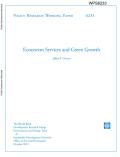
"Ecosystem services" has become a catch-phrase for the complex connections between the natural environment and human well-being. This paper considers the impact of changes in the supply of ecosystem services, and programs to increase their supply, on near-term growth of gross domestic product. It focuses on the relationship between locally generated versus transboundary services and growth in developing countries, where the highest rates of ecosystem degradation tend to be found. There is a common perception that there is a tradeoff between environmental protection and economic growth, especially in the near term. This perception can make policymakers reluctant to support environmental protection. Where the environment is a source of economically important services, then environmental protection may stimulate growth of gross domestic product instead of reducing it. The paper considers evidence on the economic value of regulating services; the degree to which ecosystems actually supply some of the services they are commonly assumed to supply; and the near-term growth implications of restoring ecosystems, and reducing their loss.
The term 'green jobs' can refer to employment in a narrowly defined set of industries providing environmental services. But it is more useful for the policy-maker to focus on the broader issue of the employment consequences of policies to correct environmental externalities such as anthropogenic climate change. Most of the literature focuses on direct employment created, with more cursory treatment of indirect and induced job creation, especially that arising from macroeconomic effects of policies. The potential adverse impacts of green growth policies on labor productivity and the costs of employment tend to be overlooked. More attention also needs to be paid in this literature to how labor markets work in different types of economies. There may be wedges between the shadow wage and the actual wage, particularly in developing countries with segmented labor markets and after adverse aggregate demand shocks, warranting a bigger and longer-lasting boost to green projects with high labor content. In these circumstances, the transition to green growth and job creation can go hand in hand.
This paper explores existing patterns of green innovation and presents an overview of green innovation policies for developing countries. The key findings from the empirical analysis are: (1) frontier green innovations are concentrated in high-income countries, few in developing countries but growing; (2) the most technologically-sophisticated developing countries are emerging as significant innovators but limited to a few technology fields; (3) there is very little South-South collaboration; (4) there is potential for expanding green production and trade; and (5) there has been little base-of-pyramid green innovation to meet the needs of poor consumers, and it is too early to draw conclusions about its scalability.
This paper focuses on how developing countries can change the way they prepare for disasters so they are better equipped to sustain economic growth. It discusses the importance of considering the goals of key decision makers and the need to understand the perceptions, systematics biases, and heuristics used by the relevant interested parties (the affected public, private and public sector organizations, and nongovernmental organizations) in choosing between alternatives. The paper highlights the importance of undertaking benefit-cost analysis to evaluate disaster risk reduction measures, recognizing that decision makers might not make meaningful use of this policy tool given their behavioral biases and simplified heuristics. To address these issues, the authors propose green growth strategies that involve multi-year contracts coupled with short-term incentives that have a chance of being implemented. The strategies focus on the role of multi-year micro-insurance, long-term loans, and multi-year catastrophe bonds that reflect the institutional arrangements in the developing country.
This paper reviews the challenges and opportunities raised by international trade for developing countries considering a green growth strategy. A key concern is the effect of environmental policies on international competitiveness. For production-generated pollution, there is evidence that stringent environmental policy reduces some indicators of competitiveness, but the effect is small in most sectors. However, tightening up environmental standards is unlikely to reduce international competitiveness when pollution is generated by consumption. And where depletion of natural capital is a threat, effective environmental policy is an important component of a policy aimed at developing long-run international competitiveness. The effects of trade on environmental policy, the interaction between trade and technology transfer, and the interaction between trade and transboundary environmental problems are also reviewed. An emerging issue is the potential use of border taxes to curtail carbon leakage. The paper discusses some of the possible responses by developing countries.
